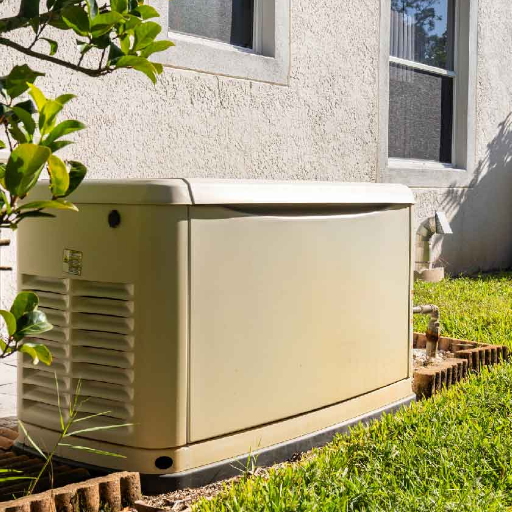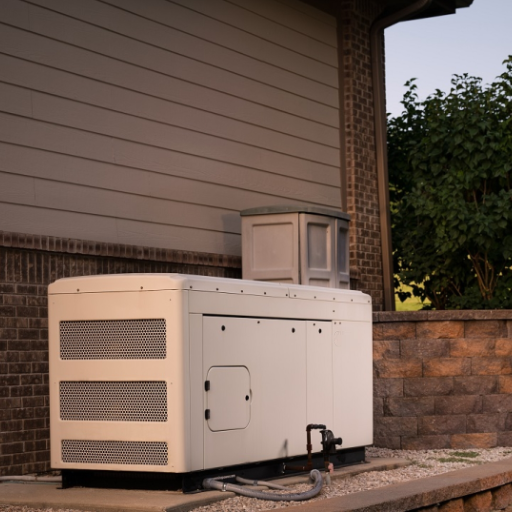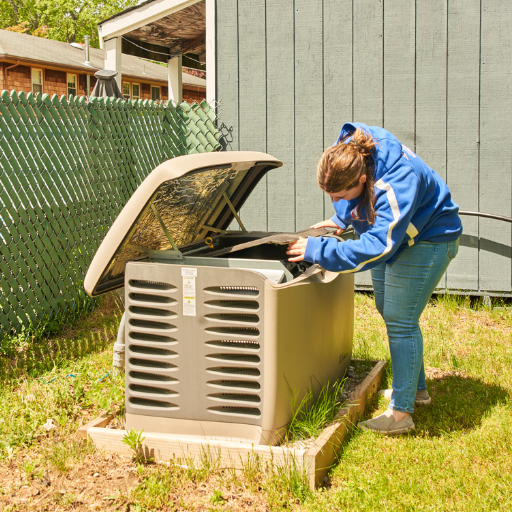Fuel efficiency is a crucial factor for buyers when it comes to selecting a generator. Most of the customers would rank this point at the forefront of their list. The process of getting ready for emergencies, enjoying outdoor activities, or having a smooth operation on a job site can be very costly and troublesome. Still, with the right choice of generator, it’s not going to be an issue anymore. This survey seeks to reveal the best fuel-efficient generators on the market and also to provide you with the most critical aspects that you need to think about before buying a generator. The article ranges from knowing the power output needs to examining and assessing the latest energy-saving technologies, hence providing and gathering all the necessary pieces of information to make an eco-friendly and wise choice. So, it is still possible to have reliable power despite being exceptionally energy-efficient. Read more about it in the following section!
Introduction to Generators
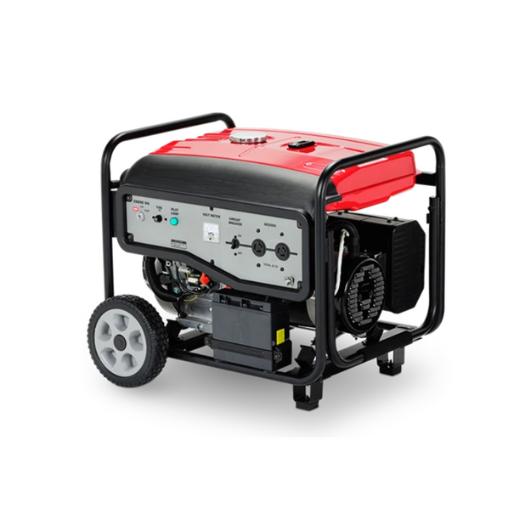
The main reason for the design and creation of generators was to provide electricity when the power grid is unreachable or has limited access. The conversion of mechanical energy into electrical energy is the principle that all generators are based on, making them useful in many applications, such as providing additional energy in a blackout situation, and being a must-have for a worksite where power tools are applied, and even for those who are trying to live off the grid. The latest power gadgets come in numerous sizes and are supported by various fuel types; thus, offering the users the widest choice, and this is how they are matching the power requirements and the environmental standards. Consequently, the once-conventional noisemakers are now being taken over by these new, quieter models that also require less fuel through the course of operation due to technological advancements.
What is a Generator?
Generators are machines that convert one form of energy into another, electrical energy, and make it available where and when it is most needed. The presence of an internal combustion engine is typically the source of the mechanical energy that the rotor of the generator uses and is responsible for the induction of electricity through the process of electromagnetic induction. Situations that demand non-traditional or unreliable power sources, such as emergencies, off-the-grid living, or construction, are some of the places where these machines are utilized. Total energy solutions, such as renewable energy, quieter operation, enhanced fuel efficiency, and environmental integration, that is, integration with renewable energy sources, all have this in common, including the electric needs at home.
Importance of Fuel Efficiency
Fuel efficiency is crucial for modern generators to work and last longer on the same amount of fuel. The new fuel-efficient gens not only help to cut through the operational costs but they also contribute to the environment by lowering greenhouse gases through lesser emissions. Since the price of petrol is climbing and green power is being stressed more and more, fuel-efficient generators are turning out to be a key component in many applications. Advanced technology is widely applied in current models for fuel consumption optimization with the help of features like smart throttling. The engine speed adapts to power demand. Besides, so many fuel-efficient generators can outlast their competition in terms of productivity/satisfaction due to their ability to run on less fuel for a more extended period, thus being appropriate for emergency use and deployment in space-exempt sites. The focus on efficiency also guarantees users the ability to keep their generators cost-effective and green-friendly.
Overview of Fuel Types
| Fuel Type | Efficiency | Availability | Cost | Environmental Impact | Storage Requirement |
|---|---|---|---|---|---|
| Gasoline | Moderate | Widely available | Affordable | Higher emissions | Requires proper ventilation |
| Diesel | High | Readily available | Cost-effective | Lower CO emissions | Stable for long-term storage |
| Propane (LPG) | Moderate | Easily accessible | Low-to-moderate | Cleaner burning | Requires pressurized tanks |
| Natural Gas | Consistent | Available in urban areas | Moderate | Lower emissions | Connected to pipes |
| Solar | Limited by sunlight | Renewable energy | High upfront | Zero emissions | Requires battery backup |
Types of Fuel-Efficient Generators
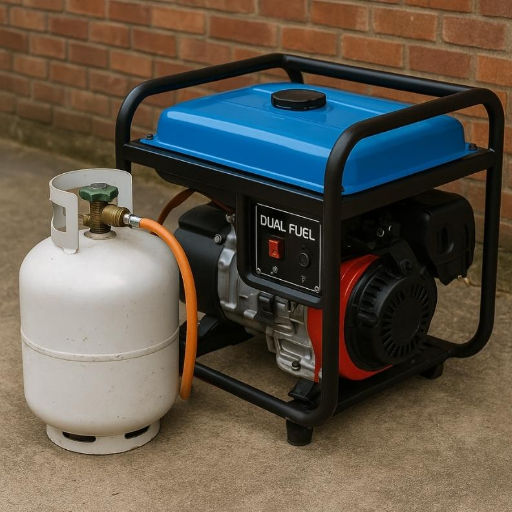
Diesel Generators
Diesel-powered machines have a reputation for not just being very capable but also long-lasting. They need less fuel than gasoline-fueled generators, and they are much more resistant to supplying electrical power, which is stable, reliable, and suitable for providing the power needs of big enterprises.
Propane (LPG) Generators
Propane generators give a more eco-friendly fuel and are easy to get. They are best suited for low-emission requirements, and they also give a longer shelf life for the fuel.
Natural Gas Generators
These generators are quite the thing for metropolitan areas where they can be easily linked to the local gas network. The generators are clean in their operation and perform stably, but may be less effective in the case of off-grid( remote) conditions.
Solar Generators
Solar generators harness the power of the sun—all natural and pure—so they do not add to the greenhouse gases. Despite depending on the sunlight and leaving the owner to incur the higher upfront cost initially, they are still environmentally friendly and perfect for small applications.
Gasoline Generators
Gasoline generators are one of the best portable power sources, used frequently and also available at most places. They run on gas engines, and one of their characteristics is being inexpensive and user-friendly at the same time. In this regard, it can be a great tool at the construction sites for the workers and obviously for the homeowners or campers who need electricity. Nonetheless, the gasoline-powered machines tend to emit more pollutants in comparison with the other types, and the storage of their fuel can eventually be a risky matter. Also, they have to be serviced regularly to obtain the best performance, among the points being that oil levels and filters should be checked. The latest technology has come up with modern models to feature fuel consumption improvement and noise reduction, thus giving users environmentally friendly and quieter options.
Diesel Generators
Diesel generators have been a constant in the field due to their toughness and economy in fuel consumption, thereby being a good pick for industrial and domestic purposes. Diesel generators depend on diesel fuel, which is more concentrated in energy content compared to gasoline; hence, they offer long-run power and the least fuel-supply-reliant operation. Already, new diesel generators have been conceived to conform to the most stringent emission norms by the use of technology that includes catalytic converters and particulate filters. As they are fit for use in harsh working conditions, their use will provide a steady power supply in the case of blackouts, thus they tend to be the first choice in remote locations or continuing power shutdowns. Diesel generators, while being the most efficient, have the main disadvantage of needing higher initial investments apart from the regular maintenance that should involve engine checking and fuel condition monitoring. The care for the environment is of great concern, so that new ways have appeared that are mainly directed to environmental protection and user comfort, an excellent example being the reduction of noise level and a diesel-wind-solar-generator hybrid.
Propane Generators
Propane-fuelled power generators have witnessed a massive jump in popularity mainly due to their extremely environmentally friendly and long storability characteristics of their fuel. Unlike gasoline, propane doesn’t degrade over time, which means it really comes as a good option for emergency power needs. These generators give off fewer emissions than their diesel counterparts, thus adding to a less damaging environmental footprint too. In addition, propane is easily obtainable and can be stored in huge tanks that keep a steady power source even during extended outages. The latest propane generators come with various advanced features like remote monitoring, automatic start systems, and better fuel efficiency, thus making them reliable and user-friendly. They will not only save your electricity but also have the lowest impact on the environment compared to others.
Criteria for Evaluating Efficiency
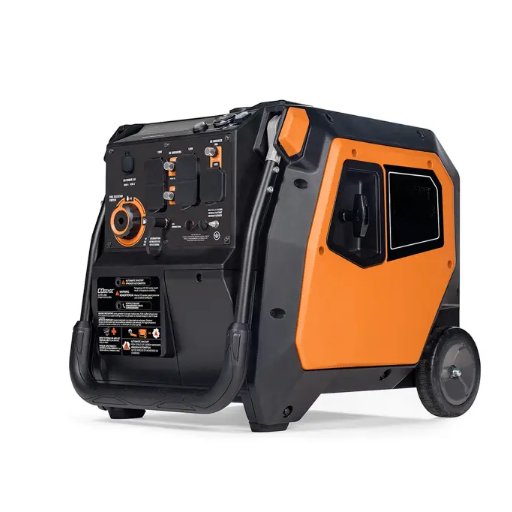
When analyzing the fuel of a propane generator, you should see the following criteria:
- Fuel Consumption: Try to see how much propane the generator is consuming per hour under the most common and the most powerful load. Less consumption of the fuel is equal to more efficiency.
- Power Output: Compare the generator’s power output (watts) with the power you need. A good generator should provide enough power without the unnecessary use of fuel.
- Run Time: The length of time that the generator can run on a single tank of propane is to be checked. The longer run times indicate the great fuel-to-energy conversion.
- Maintenance Requirements: Opt for machines that are built with user-friendly maintenance in mind. This is going to be one of the factors that translates to fuel saving in the long run, that is, reduced operational cost.
- Environmental Impact: Make sure that the generator is not only compliant with the emission standards but also, among other reasons, it is less likely to be blamed for polluting the environment, making it the sustainable option out there.
When these considerations are considered, one can more accurately weigh the generator’s effectiveness in meeting personal demands.
Understanding kWh per Gallon
During an evaluation of generators, the parameter of kilowatt-hours (kWh) per gallon is a crucial one to grasp and realize the fuel efficiency. This is because it tells one the amount of electrical energy that can be generated from one gallon of fuel, e.g., a modern diesel generator often reaches the efficiency values lying between 10 and 20 kWh per gallon, depending on the loads and quality of the designing process. The operating systems with clean combustion technology and engines that are optimized can push these numbers even further, and the advantages of this option are that they will be more cost-effective in the long run. Making the difference by comparing each model based on this code will let you quantitatively know or comprehend their efficiency, and thus, the operational costs in connection with energy output will be clear.
Wattage and Power Output
Wattage and power output are two of the most important factors to be taken into consideration when evaluating diesel generators. The power output of the diesel generator is generally considered in kilowatts (kW), which is the maximum energy that the generator can produce under given conditions. The range of standard diesel generators starts from small and movable machines that can deliver from 1 to 10 kW of power and are mostly suitable for residential use. At the same time, it goes up to large industrial units that are capable of generating several megawatts. Knowing your power requirements is a very important factor, as running a generator at the correct load levels will increase its efficiency and also prolong its lifespan. Moreover, the current progress in generator technology makes it possible to manage power more precisely with the use of load balancing and power scaling options, which ensure the delivery of energy in an efficient manner and without any waste.
Portability Considerations
Product portability assessment consists of a mix of elements, with the prime ones being the volume, mass, and built-in mobility aids such as wheels and handles. The ease of use and transport for some of the most viable applications, such as emergency power supply or back-up, among others, is directly proportional to the size and mass of the generators, which are most of the time very small and light. With the current trend in the use of portable generators, even the most popular ones are characterized by being ergonomically designed and very mobile. The smoothness of the movement has been the key factor, with camping, tailgating, and remote area uses being the significant applications of these portable generators. Besides that, the flooding of the market with silent model innovations that, in a way, take the portable and quiet generator features a step further by bringing together the positive aspects of both would-be noisier ones and the tranquil ones, has also been observed. There are a lot of aspects to look into when it comes to generator portability, and one of them is the level of portability that a generator can provide, which can make or break the experience.
Best Fuel-Efficient Generators Available
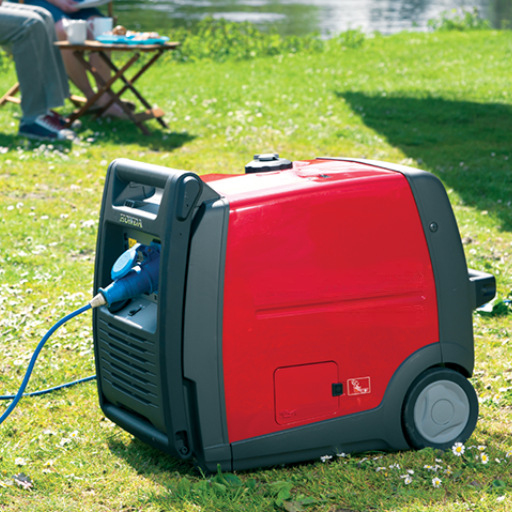
1. Honda EU2200i
Recognized for its dependability and noiseless running, the Honda EU2200i comes as a top-notch fuel-saving option. The presence of an eco-throttle system lets the generator adapt the fuel usage according to the load and provide up to 8.1 hours of uninterrupted operation on one tank.
2. Westinghouse iGen2200
This very lightweight and transportable generator carries a cutting-edge engine design which ensures up to 12 hours of runtime with only a 25% load. It is the right choice for individual small appliances and electronics, and all the while monitoring the fuel consumption.
3. Yamaha EF2000iSv2
Known as the model with the best gas mileage, this one manages to stay on its feet for 10.5 hours at a 25% load by dint of its innovative throttle technology, which readjusts engine speed to fit the demand.
4. Champion 2000-Watt Dual Fuel
Giving an option of using two fuels, this generator is a great, fuel-efficient companion for long-lasting work. With propane, it operates very cleanly and efficiently for longer periods, thus being a very flexible option.
Top Honda Generators
Honda EU2200i
The Honda EU2200i is, no doubt, one of the best portable generators available as far as reliability and fuel are concerned. It has a maximum power of 2,200 watts, which supports a variety of applications from household appliances to power tools. Its fuel consumption is declared for hours, allowing it to run up to 8.1 hours at a 25% load on a single gas tank. The low noise level and the light weight have put Honda EU2200i in the best position for sources of power, both in camping, tailgating, or other outdoor activities, as well as for home backup.
Honda EB2800i
This model is intended for customers who need a consistent power supply for work sites and living areas. For a start, the EB2800i produces 2,800 watts of power and comes with such features as a sturdy frame, long run times, and a relatively compact design. This is an inverter generator with Honda’s unique advanced inverter technology that allows you to have a smooth and stable power supply that is safe for sensitive electronics like laptops and smartphones.
Honda EU3000iS
The Honda EU3000iS has an excellent reputation for its quiet operation and high power output. It has a capacity of 3,000 watts, enough to power household appliances such as refrigerators and air conditioners, and at the same time, it delivers fuel-efficient operation quite impressively. This generator, designed for 20 hours of continuous operation at 25% load before refueling, is perfect for users who require extended hours of power supply, and it does not disappoint. Having an electric start and a durable build, this generator is also very reliable and user-friendly.
Comparing Diesel Generators
Comparing diesel generators, the consideration of the following key factors is essential: fuel efficiency, power output, durability, and maintenance requirements. Diesel generators are most of the time the option because of the energy that is being saved and their economics. Diesel engines, over a long period of time, on average, consume less fuel than gasoline engines during operation in the absence of heavy overloads and under usual conditions. This cost-saving feature makes them the best choice for use in highly demanding applications and as a source of standby power during long durations. At the same time, one of the significant advantages of diesel generators is their longevity and robustness. Diesel generators are designed for heavy work and can therefore usually last longer than other types of generators. They are also excellent for the duty, with a lot of units maintaining output for industrial machinery, construction sites, and significant residential areas.
Modern diesel generators are popular for producing minimal emissions mainly because of engine technology. This innovation has made them a greener choice than the previous models. One of the best-selling examples is the Cummins Onan Quiet Diesel because of its noise control tech and the Generac Protector series, which has become a benchmark due to its automatic and robust features. The potential noise issues should influence the generator choice, the amount of space available, and the maintenance schedule. In fact, the long-term savings from the power efficiency and robustness will often justify the higher initial cost, making some diesel-powered models the most cost-effective choice for a variety of applications.
Innovative Features in Modern Generators
Remote Monitoring and Control
One of the key features of generators like Cummins is that these are already connected with the internet, so users don’t have to worry about extra add-on devices to start or stop the generator remotely. Besides that, many other models are equipped with such a feature, but they mainly use Wi-Fi or cellular connectivity. And just like the generator described above, the users can make use of them to check the gen-set condition without necessarily climbing into the engine room.
Automatic Transfer Switch (ATS)
Automatic Transfer Switch (ATS) equipped generators are capable of signaling a power outage without any human intervention and can switch the power source from the grid to the generator automatically. Such a feature results in the seamless operation and reduced downtimes during power failures.
Fuel Efficiency Technology
Nowadays, the smart diesel and gas-fueled generators have been empowered by additional features like Eco-Modes and Variable Speed Technology to control the load-dependent fuel consumption. For instance, the Honda inverter generators, rather than burning fuel efficiently and lessening running costs and environmental footprint, release less carbon dioxide.
Noise Reduction Systems
One vital factor that is a deal-breaker for most users of generators is the noise. Today’s design elements have incorporated soundproofing cases, anti-vibration mounts, and better exhaust systems, among others. Generators such as the Cummins QuietConnect are designed to work quietly, producing noise levels as low as 60 decibels only.
Dual-Fuel Capability
In the event of a supply disruption, which Champion 7500-Watt Dual Fuel Generator demonstrates, the flexibility to utilize both propane and gasoline would be an advantage of a dual-fuel generator, thus leading to increased convenience and operational flexibility. Hence, the feature in these models guarantees that users have the choice of fuel on the go when the need arises. This is a big plus during a power outage because people will still be able to charge their phones and use other emergency devices.
Smart Diagnostics and Predictive Maintenance
Among other incidents, but similar to what the Champion 7500-Watt Dual Fuel Generator comes with, an alert system can be installed in the generator to notify maintenance needs, such as changing oil, filters, and checking the whole system. In addition to notification systems, some generators also use predictive analytics to forewarn possible issues coming ahead, which ultimately diminishes operational disruptions and increases the longevity of the generator.
Home Emergency Generators
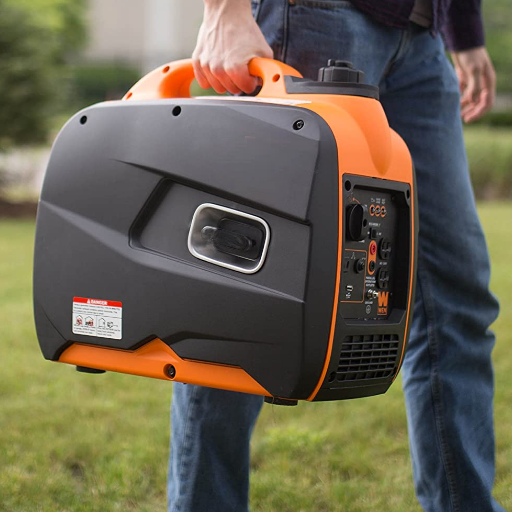
Emergency power generators for home use are mainly used to back up the power during the time of power disruptions, which are usually due to storms, grid failures, or natural disasters. They are specially designed to keep the critical appliances like the refrigerator, lights, and medical equipment powered so that the safety and comfort in your home are maintained. A lot of models are mobile and very simple to use; this is because they are equipped with an automatic start and commonly available fuels like gas or propane. Therefore, buying a generator for a house is not only a secure way of protecting your household from a sudden power cut, but it is also a great relief to have.
Why You Need a Home Emergency Generator
House electricity generators are one of the most convenient purchases, especially when there is a major fault or problem with the electrical system, as they give the home a proper power backup. It is likely that there will be more outages in the future and that too for extended periods because of such factors as climatic conditions causing extreme damage and a power infrastructure that is getting old. A reliable way to count out the possible disasters is by the use of a generator that will run key systems like heating and cooling, medical devices, and security systems, apart from keeping the everyday inconvenience at a minimum. The latest models of generators maintain at least the same level of necessary power with much less fuel consumption and a negligible greenhouse effect caused by the engine, and many of them are designed with all the new electronics technologies on board for even higher emission standards and less noise. Moreover, they can be a property asset because buyers consider them a valuable part of a house. To sum up, the home emergency generator is the protector, the peacekeeper, and the wisdom-bearing investment in light of such risks nowadays.
Key Features to Look For
Power Output
Determine the calculations of wattage essential to power up your home’s critical systems. Residential plug-in generators typically come in sizes ranging from as low as 5,000 watts for tiny homes to larger outputs that are way over 20,000 watts for grand ones. Write down the essential appliances and the amount of wattage consumed by each one to be able to do an accurate needs calculation.
Fuel Type and Efficiency
Generators have the power of different fuels like petrol, propane, natural gas, or diesel. Look for a fuel type that is available near you. Besides this, the models that are most efficient with fuel are the least costly methods and have a smaller environmental footprint.
Automatic Transfer Switch (ATS)
ATS is the device that makes it possible for the generator to kick in on its own when there is a power failure. This, in turn, saves you the manual setup hassle and ensures that even during power outages, there is no break in the power supply for critical systems like the hospital equipment or the HVAC system in your house.
Run Time and Tank Capacity
Would you mind checking the run time of the generator and how much the fuel tank can store? As an illustration, coolant can be operated for approximately 10-12 hours with a full fuel tank, which makes it perfect for a power failure that happens during the night.
Noise Level
When the generator is used in inhabited areas, the quieter models should be sought, especially. Among several units, some include noise-reducing elements which make them operate at as low as 50-60 decibels, being equal to typical talk.
Portability and Size
In view of different power needs, you might opt for a portable generator for the sake of being able to transport it wherever you go or a stationary one for regular home usage. It is always possible to load and move the small-sized models with less difficulty; however, they may be less efficient than more powerful and stationary ones.
Safety Tips for Home Use
⚠️ Important Safety Information
Proper Ventilation
Not only do operators shut off the generator in well-ventilated spaces to avoid deadly carbon monoxide poisoning. As per CDC reports, more than 400 individuals in the U. S. die annually due to accidental CO poisoning, a lot of times because of wrong generator usage.
Distance from Living Areas
The generator should be placed at a minimum distance of 20 feet from the household structure. This will help to keep the fumes away from the house and will also prevent the fumes from getting into the rooms through the doors, windows, or vents.
Avoid Overloading
One has to make sure that the generator’s watt capacity is in line with the user’s energy demand. Power overload can both destroy the device and also connected appliances. The generator’s user manual can provide the user with an exact load limit computation.
Fuel Storage
Fuel should be kept in containers that have been approved, put in a safe place, away from any source of heat or flame, and ensure that the generator has cooled down before refueling. Spillage of fuel onto a hot engine can easily set off a fire.
Use Approved Connections
Connect the appliances directly to the generator or utilize heavy-duty, outdoor-rated extension cords having three-pronged plugs. Under no circumstances is it sensible and safe to attempt to feed power back into the wiring of your home—this is dangerous and against the law.
Weather Protection
While using the generator outdoors, keep it protected from rain or snow. Invest in a generator tent or canopy designed to shield it during adverse weather.
Reference Sources
An Analysis of The Distinction Of Generator And Efficiency
Summary: This study compares DC and AC generators, highlighting that DC generators, especially low RPM models, achieve higher voltage levels (e.g., 25V) compared to their AC counterparts.
Variable Speed Diesel Electric Generators
Summary: This paper explores the use of variable-speed diesel electric generators (VSDEG) in distributed generation systems. It demonstrates their potential to improve fuel efficiency and reduce greenhouse gas emissions compared to traditional fixed-speed generators.
Frequently Asked Questions (FAQs)
What are the benefits of fuel-efficient generators?
Fuel-efficient generators are designed to be economical, consuming lower-than-average gas but still delivering the same power. This way, you can take advantage of fuels but put less cash in your pockets for that. They usually are very energy efficient, making them able to convert a larger fraction of the fuel into electrical energy. By using less fuel, these generators also generate less waste heat, and that is why they are an eco-friendly option. Furthermore, fuel-efficient models are often equipped with innovative technology that supports the range of the units with the demand, thus making them even more efficient.
How do diesel generators compare to other types of generators?
The reliability and durability of diesel generators are known characteristics, and they are often the go-to solution for backup power. Portable generators are generally less expensive, but they consume more fuel and have shorter run times. Diesel-engine-generator sets can transport more electrical power and are best for high-wattage applications. In addition, these machines usually have add-on packages that consist of a transfer switch, which ensures that your home is never left in the dark. Even though the initial cost could be high, the fuel savings in the long run can offset the cost balance, and depending on using a diesel generator, it will ultimately be the most cost-effective option.
What should I consider when choosing the best generator for my home?
If you want to choose the right generator for your house installation, you should first determine your power consumption level according to your rated load. Think about the appliances’ watt load whose power you want to reduce and how or how much you use/are used to using electricity. Besides, the generator purchasing guide should be scrutinized as well to know the generators well and to be able to make an intelligent purchasing decision. Also, search for the generator that has the eco-mode feature for fuel efficiency, and verify that the unit has enough power to meet the highest demand in the house. And don’t forget that there will be an additional cost of setting up the system, including the transfer switch.
How do I install a generator with a transfer switch?
Setting up a generator along with a transfer switch is the most essential job to perform for safety and stable backup power. A transfer switch is the one that allows connecting the generator with the home electrical system directly, thus preventing back-feeding the power lines. The very first thing is to talk to a licensed electrician who will check your home requirements and accordingly recommend the generator size and the transfer switch type. Coming back to the fact, the installation process will start with the switch, which will be the effective tool in changing from grid power to generator power during the period of interruption in the supply of electricity. Follow all codes and regulations regarding your area to ensure the safety of the process.



